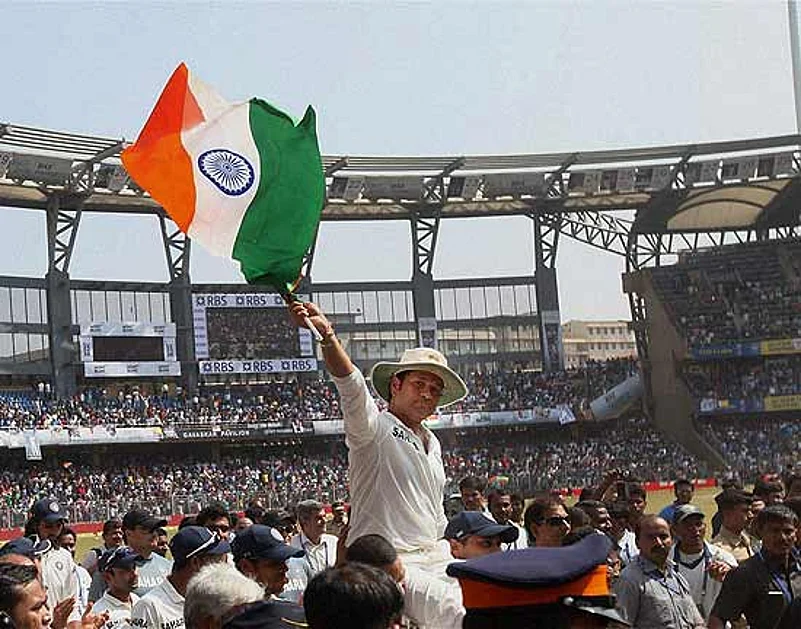This is the second Indian edition of the Wisden Almanack. It’s also the 150th year of Wisden, which is genuine cause for celebration and general optimism toward the human condition, and an excuse for lighting candles deep in the night, set in secret pentagrammic patterns. With creative paralysis and awful embarrassment, I now become the 25,754th person to quote C.L.R. James: “What do they know of cricket who only cricket know?”
This is a 927-page book. No one expects you to read the whole thing at a go (or at several goes), because the Wisden Almanack is many things at once: It tries to be a collection of the finest cricket writing, focusing on the year in review, and matters more atemporal. It records results (and often, short match reports) of all cricket matches played in the region, and reports on the quirky, the strange and the whimsical that are so much part of the game. Where else would you get to know that actor Jason Alexander, George in Seinfeld, “posted a thousand-word apology after repeatedly calling cricket ‘a gay sport’ on an American talk show”? “Some of his followers on Twitter had told him that they were both gay and offended. There were no reports of complaints from cricketers.” As far as I remember, George, though frequently unemployed, worked for several seasons for the baseball team New York Yankees. What an idiot!
This year’s Wisden India Almanack brings together a collection of unlikely names. All right, Mike Marqusee tries hard to figure out (like countless writers before him, and perhaps he himself, many times) what it is about cricket that—well, that makes cricket. But there’s also Pico Iyer recalling his schooldays in England as the scorer for the second team, and writes the loveliest sentence I’ve read about the English weather for a very long time: “If you are lucky, this is one of the three days the British government allows every year for sunshine.” Tariq Ali presents a little play on spot-fixing, while paying tribute to Samuel Beckett (the only Nobel laureate to have ever played first-class cricket) and that master of the quiet grim theatre of enigmatic battle, suppression of desire and letting that ball outside the off-stump go—who else but Harold Pinter.
And then there’s Sachin Tendulkar, to whom a 40-page section—His Last Bow—is devoted. The odes are aplenty. But asking former English fast bowler Angus Fraser to write on Sachin is a truly inspired bit of editorial thinking: Fraser bowled the delivery that Sachin struck for three to reach his first Test hundred. Sachin’s farewell speech at the Wankhede Stadium is reproduced in full, and that should be valuable for all cricket fans and nostalgiacs.
But Wisden India Almanack 2014 also has place for a lot of anger, and rightly so. Editor Suresh Menon makes no bones about what he believes about the IPL spot-fixing scandal, and is backed up by several writers who care for the game and nothing else. Things are not well in Indian cricket, and Wisden tells it like it is. It also laments, in a genteel fashion (of course). Mudar Patherya reminds us that it took 108 years for the first 1,000 Test matches to be played; it has taken less than 28 years to play the next 1,000. “The time spent in watching the game is now inversely proportional to one’s ability to retain it,” he writes.
But, oh, how events overtake printing schedules! When this book went to print (it covers the period June 2012 to September 2013, except for that unavoidable ‘stop press’ notice for Sachin’s retirement), Indian cricket appeared to be in ‘rude health’. Australia was a shattered team, having lost 4-0 to India and the Ashes too. Today, Australia is resurgent; English players are having nervous breakdowns, and India suddenly seems confused and lost. But then, the game’s very timelessness disguises the nature of the beasts: all those creatures waiting to sneak up on you just when you were signing that billion-rupee endorsement contract.
Wisden exists to keep us aware and cognizant, to celebrate the most pointless game ever invented—and therein lies its greatness. Why should there be a point after all? What about Jade Child, from Launceston, Tasmania? He “set a world record for the longest net session, batting for 25 hours and facing 15,701 deliveries from a bowling machine and local bowlers. The previous record stood at 12,353 balls”. Go, Jade! And rot in hell, George Costanza, of the New York Yankees!























